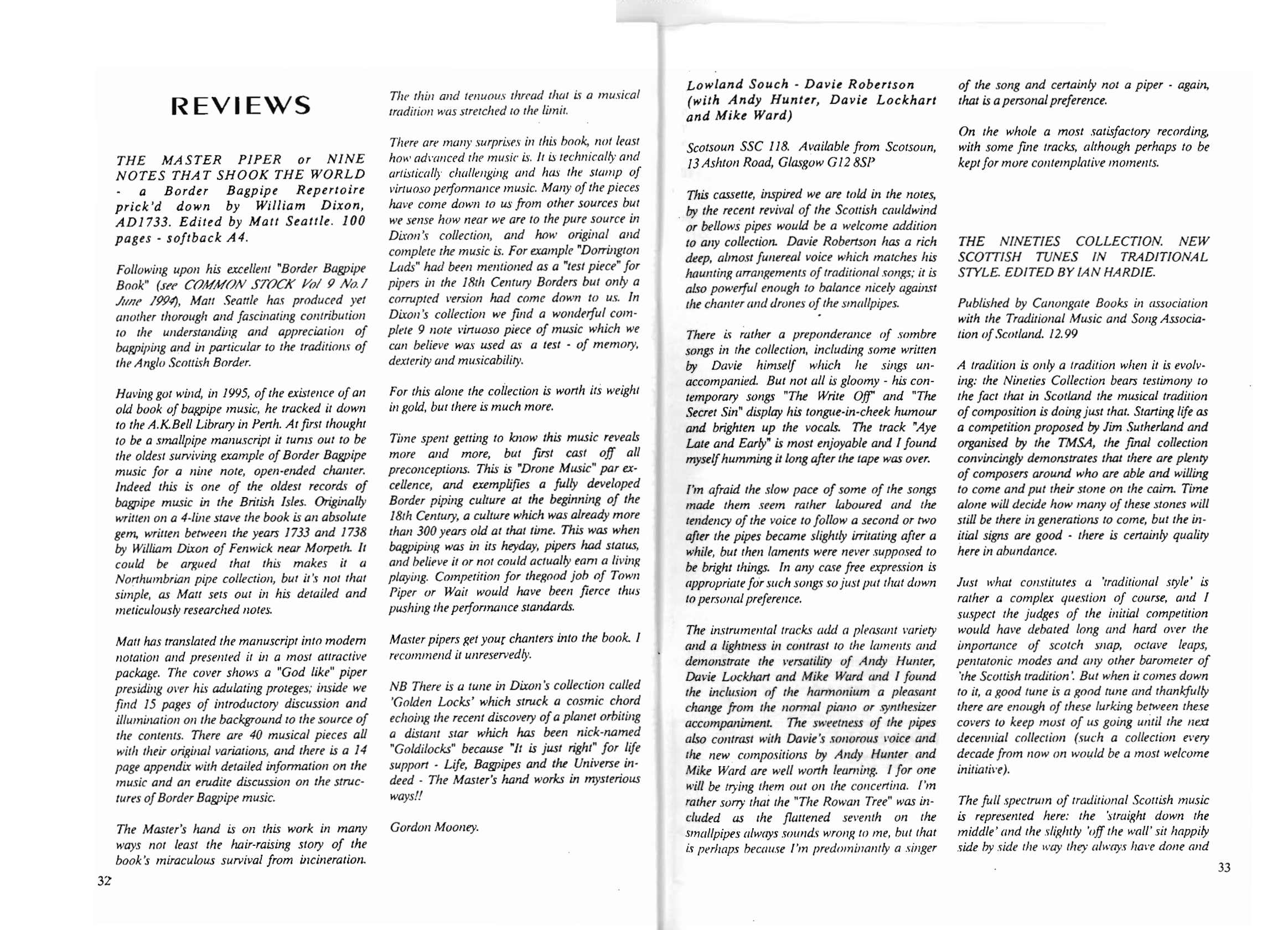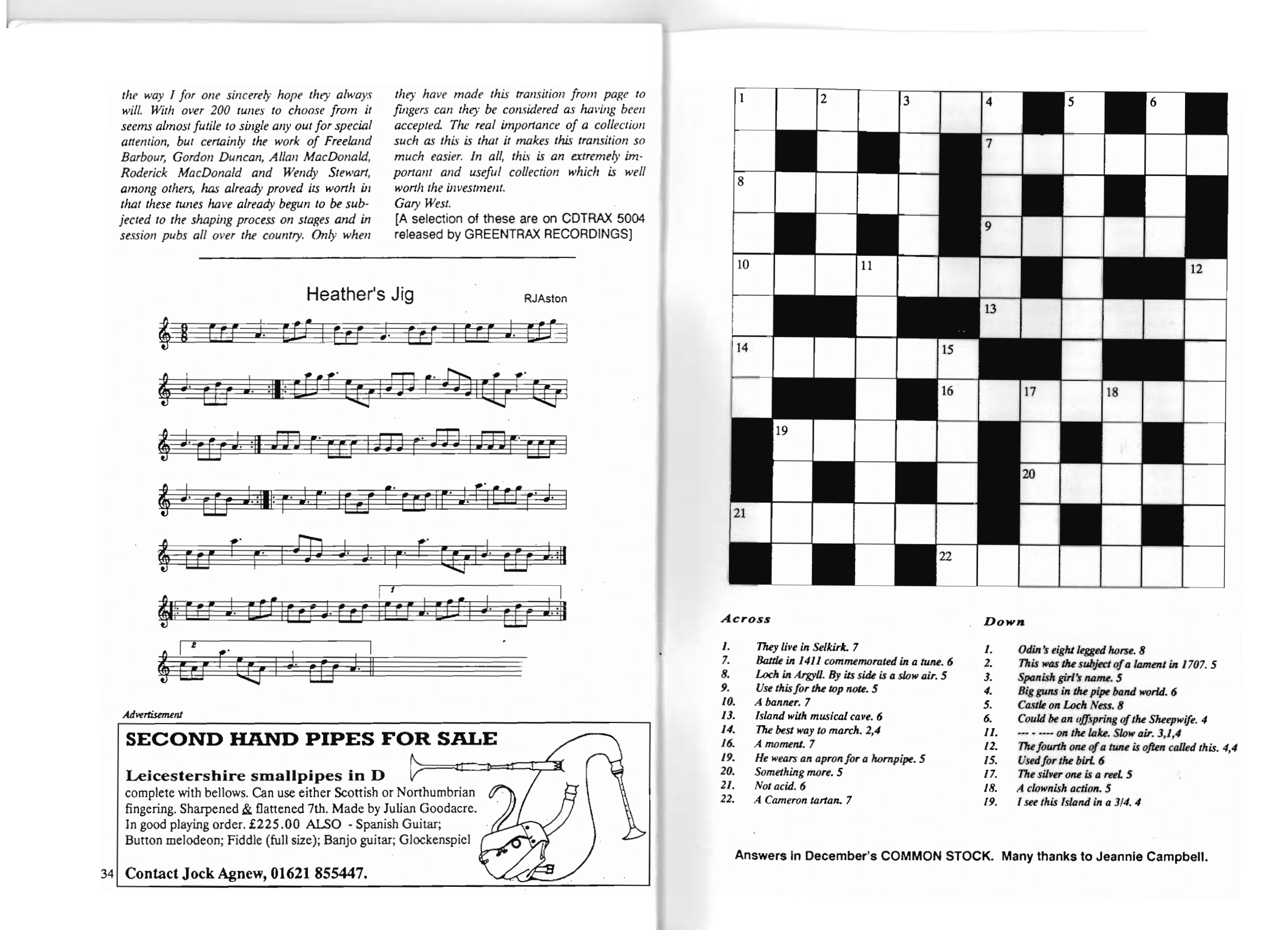Reviews 1996: Book; The Master Piper - Cassette: Davie Robertson



- a Border Bagpipe Repertoire prick’d down by William Dixon, AD1733. Edited by Matt Seattle. 100 pages - softback A4.
Following upon his excellent “Border Bagpipe Book” (see COMMON STOCK Vol 9 No.1 June 1994), Matt Seattle has produced yet another thorough and fascinating contribution to the understanding and appreciation of bagpiping and in particular to the traditions of the Anglo Scottish Border. Having got wind, in 1995, of the existence of an old book of bagpipe music, he tracked it down to the A.K. Bell Library in Perth. At first thought to be a smallpipe manuscript it turns out to be the oldest surviving example of Border Bagpipe music for a nine note, open-ended chanter. Indeed this is one of the oldest records of bagpipe music in the British Isles. Originally written on a 4-line stave the book is an absolute gem, written between the years 1733 and 1738 by William Dixon of Fenwick near Morpeth. It could be argued that this makes it a Northumbrian pipe collection, but it’s not that simple, as Matt sets out in his detailed and meticulously researched notes.
Matt has translated the manuscript into modern notation and presented it in a most attractive package. The cover shows a “God like” piper presiding over his adulating proteges; inside we find 15 pages of introductory discussion and illumination on the background to the source of the contents. There are 40 musical pieces all with their original variations, and there is a 14 page appendix with detailed information on the music and an erudite discussion on the structures of Border Bagpipe music. The Master's hand is on this work in many ways not least the hair-raising story of the book’s miraculous survival from incineration.
The thin and tenuous thread that is a musical tradition was stretched to the limit.
There are many surprises in this book, not least how advanced the music is. It is technically and artistically challenging and has the stamp of virtuoso performance music. Many of the pieces have come down to us from other sources but we sense how near we are to the pure source in Dixon’s collection, and how original and complete the music is. For example “Dorrington Lads” had been mentioned as a “test piece” for pipers in the 18th Century Borders but only a corrupted version had come down to us. In Dixon's collection we find a wonderful complete 9 note virtuoso piece of music which we can believe was used as a test - of memory, dexterity and musicability.
For this alone the collection is worth its weight in gold, but there is much more. Time spent getting to know this music reveals more and more, but first cast off all preconceptions. This is “Drone Music” par excellence, and exemplifies a fully developed Border piping culture at the beginning of the 18th Century, a culture which was already more than 300 years old at that time. This was when bagpiping was in its heyday, pipers had status, and believe it or not could actually earn a living playing. Competition for the good job of Town Piper or Wait would have been fierce thus pushing the performance standards.
Master pipers get your chanters into the book, I recommend it unreservedly.
NB There is a tune in Dixon's collection called ‘Golden Locks’ which struck a cosmic chord echoing the recent discovery of a planet orbiting a distant star which has been nick-named “Goldilocks” because “it is just right” for life support - Life, Bagpipes and the Universe indeed - The Master’s hand works in mysterious ways! Gordon Mooney.
Lowland Souch - Davie Robertson (with Andy Hunter, Davie Lockhart and Mike Ward)
Scotsoun SSC 118. Available from Scotsoun, 13 Ashton Road, Glasgow G12 8SP
This cassette, inspired we are told in the notes, by the recent revival of the Scottish cauldwind or bellows pipes would be a welcome addition to any collection. Davie Robertson has a rich deep, almost funereal voice which matches his haunting arrangements of traditional songs; it is also powerful enough to balance nicely against the chanter and drones of the smallpipes.
There is rather a preponderance of sombre songs in the collection, including some written by Davie himself which he sings unaccompanied. But not all is gloomy - his contemporary songs “The Write Off” and “The Secret Sin” display his tongue-in-cheek humour and brighten up the vocals. The track “Aye Late and Early” is most enjoyable and I found myself humming it long after the tape was over.
I'm afraid the slow pace of some of the songs made them seem rather laboured and the tendency of the voice to follow a second or two after the pipes became slightly irritating after a while, but then laments were never supposed to be bright things. In any case free expression is appropriate for such songs so just put that down to personal preference.
The instrumental tracks add a pleasant variety and a lightness in contrast to the laments and demonstrate the versatility of Andy Hunter, Davie Lockhart and Mike Ward and I found the inclusion of the harmonium a pleasant change from the normal piano or synthesizer accompaniment. The sweetness of the pipes also contrast with Davie’s sonorous voice and the new compositions by Andy Hunter and Mike Ward are well worth learning. I for one will be trying them out on the concertina. I'm rather sorry that the “The Rowan Tree” was included as the flattened seventh on the Smallpipes always sounds wrong to me, but that is perhaps because I'm predominantly a singer of the song and certainly not a piper - again, that is a personal preference.
On the whole a most satisfactory recording, with some fine tracks, although perhaps to be kept for more contemplative moments.
_________________________________________________________________________
THE NINETIES COLLECTION. NEW SCOTTISH TUNES IN TRADITIONAL STYLE. EDITED BY IAN HARDIE.
Published by Canongate Books in association with the Traditional Music and Song Association of Scotland. 12.99
A tradition is only a tradition when it is evolving: the Nineties Collection bears testimony to the fact that in Scotland the musical tradition of composition is doing just that. Starting life as a competition proposed by Jim Sutherland and organised by the TMSA, the final collec-tion convincingly demonstrates that there are plenty of composers around who are able and willing to come and put their stone on the cairn. Time alone will decide how many of these stones will still be there in generations to come, but the initial signs are good - there is certainly quality here in abundance.
Just what constitutes a ‘traditional style’ is rather a complex question of course, and I suspect the judges of the initial competition would have debated long and hard over the importance of scotch snap, octave leaps, pentatonic modes and any other barometer of ‘the Scottish tradition’. But when it comes down to it, a good tune is a good tune and thankfully there are enough of these lurking between these covers to keep most of us going until the next decennial collection (such a collection every decade from now on would be a most welcome initiative).
The full spectrum of traditional Scottish music is represented here: the ‘straight down the middle’ and the slightly ‘off the wall’ sit happily side by side the way they always have done and the way I for one sincerely hope they always will. With over 200 tunes to choose from it seems almost futile to single any out for special attention, but certainly the work of Freeland Barbour, Gordon Duncan, Allan MacDonald, Roderick MacDonald and Wendy Stewart, among others, has already proved its worth in that these tunes have already begun to be subjected to the shaping process on stages and in session pubs all over the country. Only when they have made this transition from page to fingers can they be considered as having been accepted. The real importance of a collection such as this is that it makes this transition so much easier. In all, this is an extremely important and useful collection which is well worth the investment.
Gary West.
[A selection of these are on CDTRAX 5004 released by GREENTRAX RECORDINGS]
